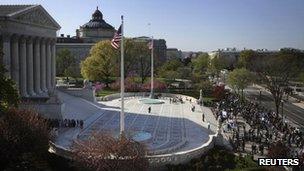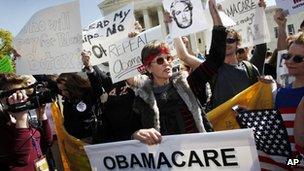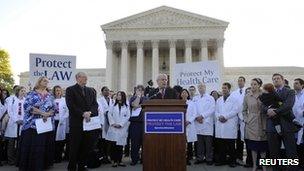'The People' stage their own healthcare debate
- Published
- comments

Rival groups are protesting outside the Supreme Court as it holds a hearing over healthcare reform
On the steps of the Supreme Court it's The People v The People. The columns of the classical court are the backdrop to rival protests, who break from time to time from chanting and singing, to argue.
A Church group, backing Obama's changes to America's healthcare system sing "Let it shine".
A group of Tea Party supporters circulate, handing out signs reading "Don't trust the liberal media".
Five men and women stand stock still, their mouths gagged with tape marked "life". I'm not sure which side they're on.
As the groups mingle, heated but pretty good-natured debates erupt. For many this is about the future direction of their country.
"If you want to know what America is going to be like look to California, and what the idiots out there are doing, with a lot of government in our lives, government telling us how to live our lives," says a thin-faced woman wearing a red headband, and holding a Tea Party banner.
"Do you have Medicare?" heckles an opponent.
"No, I have my own insurance."

Tea Party supporters oppose President Obama's reforms
If you are over 65 you have Medicare," he replies.
"We pay for that don't we?" shouts a young man.
"Are you over 65? You can't buy your own insurance?" insists the heckler.
"I look like I'm 45," says the woman, clearly for the moment more bothered by the hecklers' ungallant assumptions than his politics.
The young man who shouted out is Matthew Perdie. He has walked across America making his argument, external.
He tells me: "It is an attack on freedom, for sure."
He's talking about the big issue before the Supreme Court. The centrepiece of Obama's changes to the healthcare system is what's called "the individual mandate".
This means that Americans have to buy health insurance, just as in most countries you have to have car insurance if you drive.
The opponents say the government can't require people to buy services, any more than they can make them buy bananas.
Matthew Perdie says: "Its unconstitutional. You are forcing the taxpayers and individuals to pay for something against their own will, forcing them to comply with a contract that they never personally signed off on. This the biggest attack on our freedom to date."

A couple of doctors in white housecoats stand nearby, holding banners saying "protect the law". De Trudy Singzin of the National Physicians Alliance, external says: "The Affordable Health Care Act is one of the most important for healthcare in our country just to move us forward. What is un-American is letting people die because they don't have health insurance."
Dr Minissha Shawarma adds: "Absolutely. I mean to say this is against their freedom! I would like to know what's the loss of freedom when they have better healthcare. This is for their freedom... Healthcare is a right not a privilege".
The protesters are later joined by Rick Santorum, who is making repealing healthcare a centrepiece of his election campaign. He argues that because Mitt Romney had a similar scheme in Massachusetts he should not be the Republican candidate.
"There is one candidate who is uniquely disqualified to make the case," said Mr Santorum. "It is the reason I am here and he is not.
"It is the reason I talk about Obama and the economy and the impacts on our freedoms and Mitt Romney does not".
Nevertheless these arguments on the steps of the Supreme Court could be central in the presidential election. But perhaps less so, if those inside the court make a firm ruling in June.
If they ruled this central plank of President Obama's healthcare changes is illegal, it would have a big impact. Obama's plan may not be that popular but it still will be a centrepiece of his campaign. Exhibit A, if you will, that he has changed America profoundly and for the better.
A defeat would severely demoralise Democrats and make them wonder if they can ever achieve universal healthcare in the USA.
Their only solace would be that it would steal the Republicans' thunder, and rob them of what many consider a potent weapon.